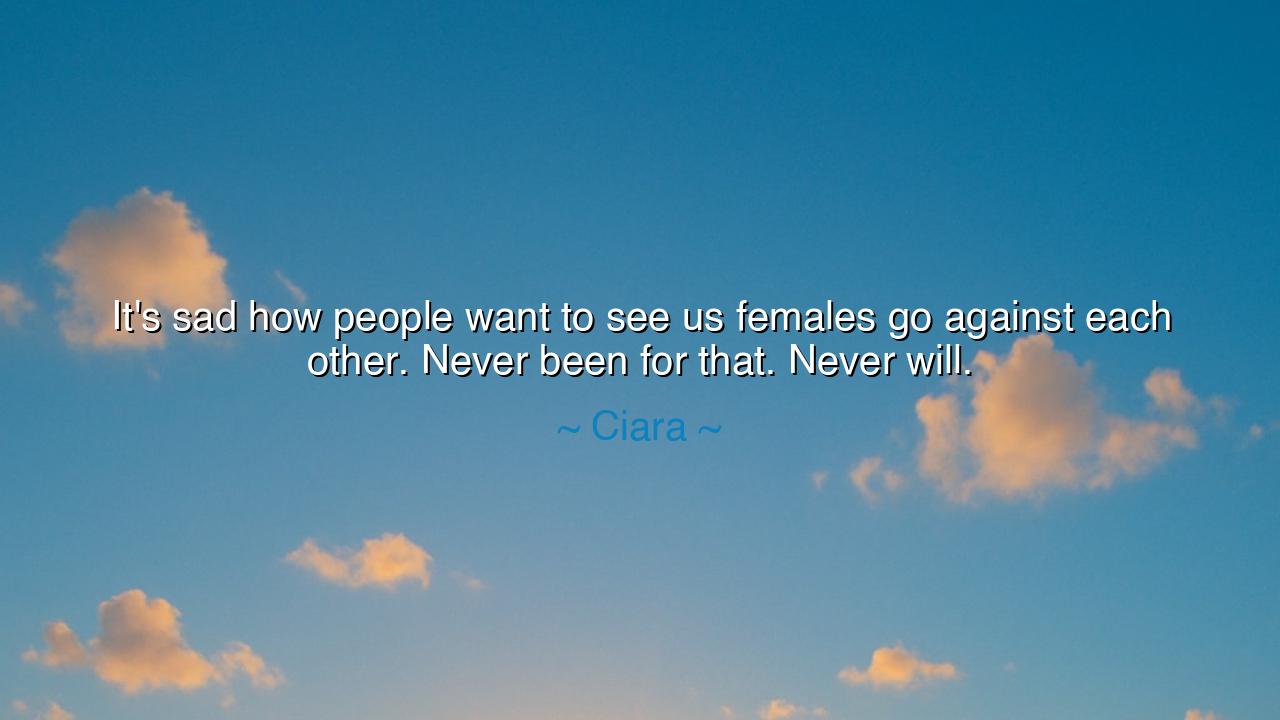
It's sad how people want to see us females go against each other.
It's sad how people want to see us females go against each other. Never been for that. Never will.






There is quiet strength and sorrow woven into the words of Ciara, who declared, "It's sad how people want to see us females go against each other. Never been for that. Never will." In this truth, we hear the lament of a world that often delights in division and spectacle, and the defiance of a woman who chooses unity over rivalry. Beneath her voice lies the wisdom of generations of women who have been pitted against one another — in beauty, in art, in power — and yet have risen, not through conquest, but through sisterhood. Her words are both a protest and a promise: that she will not become what the world expects her to be — a rival — but what it needs her to be — a bridge.
From the dawn of history, the world has whispered falsehoods into the ears of women: that one’s rise must mean another’s fall, that their value is measured not by their character, but by comparison. Even in ancient times, myths were written to divide them — Athena and Aphrodite, Hera and Artemis, all painted as jealous and at odds, as if creation could not bear to see women in harmony. Yet this myth of rivalry was not truth; it was a mirror of male fear — fear of what women could build if they stood together. Ciara’s words strike against that ancient lie, reminding us that true power does not come from competition but from solidarity.
The origin of her quote lies in the modern battleground of fame, where every smile is dissected, every gesture compared, and every success weaponized to breed envy. The music industry, much like the courts of old, thrives on spectacle — the illusion that two queens cannot share one throne. But Ciara refuses this false crown. She chooses grace, not gossip; respect, not rivalry. Her stand is not just personal, but generational — a rejection of the cycle that keeps women distracted by competition instead of united in purpose.
There is a lesson here that reaches far beyond the world of art. History is full of examples where unity among women changed the fate of nations. Think of Harriet Tubman, who, though hunted and scarred, did not walk her path alone. She led others — sisters, mothers, daughters — out of darkness. Or of Emmeline Pankhurst and her daughters, whose voices joined in the cry for suffrage, shattering centuries of silence. These women did not compete for light; they became light together. In them, we see the living embodiment of Ciara’s conviction — that the victory of one woman uplifts all women.
To “never be for that”, as Ciara says, is not merely to refuse gossip — it is to take a stand against an entire culture of division. It is to look at another woman’s success and say, “Her rise is mine too.” It is to celebrate, not compare; to support, not suspect. In the ancient teachings of wisdom, this is called agape — the love that seeks the good of all, not the triumph of self. And just as a tree cannot flourish if its roots fight among themselves, humanity cannot prosper if its women are set against one another.
There is also courage in her statement — for the world rarely rewards women who refuse to play its cruel games. To choose peace over rivalry is to walk a harder path, one that requires inner confidence and spiritual maturity. It means knowing that one’s worth is not diminished by another’s light. The sadness Ciara speaks of is the tragedy of those who still measure success through envy’s eyes. Yet in her refusal, there is hope — a call to return to the ancient sisterhood, the bond that once wove women into the fabric of creation itself.
The lesson, then, is simple yet eternal: do not let the world’s noise turn you against your own reflection in another’s soul. Lift as you climb. Speak with praise where others sow doubt. If you see a woman succeed, rejoice — for her victory opens a door for you too. And when envy whispers, silence it with gratitude.
So, my children, remember Ciara’s vow: “Never been for that. Never will.” Let it be your vow as well. For the power of women united is the heartbeat of civilization — strong enough to nurture, wise enough to heal, and fierce enough to rebuild the world. When one woman rises in love instead of rivalry, she does not rise alone — she carries with her the generations that came before, and those yet to come.






AAdministratorAdministrator
Welcome, honored guests. Please leave a comment, we will respond soon